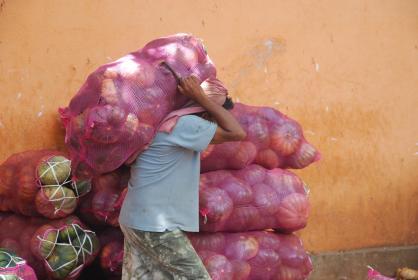Happy Moltmann Monday! Today’s selection comes from The Way of Jesus Christ in a section discussing Jesus’ acceptance of outcasts (bold mine) where he basically asks this pointed question of us: On whose backs are we gaining our righteousness? It’s worth considering.
The Pharisees despised ‘the country people’ because they did not keep the law. They were so poor that they were not in a position to do so. The righteous despised the prostitutes- women who saw no other possibility except to sell their own bodies- and called them ‘sinners’ because they could not keep the law. Similarly, the often relatively wealthy tax collectors were also despised because they did business with the Romans. No one asked why. The social cleft between rich and poor is in most cases the reason for the cleft between good and evil, the righteous and sinners.
In all societies there are ‘high fliers’ who decide what is to count as good and what bad. And there are the people on the bottom rung of the ladder, whom the people further up have to use as a way of setting off their own excellence, because they embody everything that is bad. Where this dualization leads to the formation of different classes, a merciless struggle between ‘good’ and ‘bad’ begins, which ends often enough with the extermination of ‘the bad.’…
By accepting ‘sinners and tax collectors’ and prostitutes, Jesus is not justifying the sin, the corruption or the prostitution. But he is breaking through the vicious circle of their discrimination in the system of values set up by the righteous. In this way he is also potentially rescuing ‘the righteous’ from the compulsion of self-righteousness, and saving ‘the good’ from the possession of the good. But in turning to those who are suffering from discrimination, his commitment is one-sided and partisan. By turning to them in his own person, he reveals to them and their oppressors the messianic righteousness of God, which through the justice of grace makes the unjust just, and the bad good, and the ugly beautiful. This is a forceful attack on religious and civic morality.
This is pretty straightforward, so I’ll just say a few things and leave you to ponder his words. The reality is that what culture deems “good” and “righteous” often requires money, privilege and status to obtain, things that are often simply unattainable by people struggling in poverty. Not just the difficulty of affording a college education, or having vocational choices available to you, but also every day things like buying healthy food, or making eco-friendly choices, or having a choice at all between a number of goods or services. All of these point to a systemic problem that goes far beyond ‘good’ and ‘bad.’ More often, the choice made is simply the choice that is possible under limited and limiting circumstances.
What a mess, when people of faith then place categories and levels of holiness on people’s choices in this way. What a disgrace, really.
Jesus is revolutionary because he enters into a system that, like ours today, gave righteousness points to the people who had the money and position to set the standards to work for themselves. And Jesus flatly denied them any claim on righteousness in that system at all. He overturned the whole thing, choosing instead to eat with tax collectors and prostitutes and ‘sinners’ of all kinds. By his presence, he gave prestige to the very people the system punished.
In doing so, he embodied a deeper righteousness, one which simultaneously released the ‘sinners’ from their unfair yoke of unrighteousness, and one which sought to release the yoke of self-righteousness and injustice from the power-brokers. And he proclaimed something that will always feel alien to us: the idea that righteousness comes not from our actions but from a gift only God can give us. And God chooses to do so, again and again, as particularly seen in the person of Jesus. “The justice of grace makes the unjust just.” Thanks be to God.
Indeed, this is a forceful attack on religious and civic morality, because it’s honest about what it takes to bring equity to our society. It takes a restructuring of values, one that is not defined solely by those in power. And that means people of privilege have to change.
And for most of us reading this blog, that means us. So the next time we’re tempted to make a judgment call on someone else’s righteousness, it might behoove us to ask what other choices were- and were not- available to them. Perhaps we can find compassion for them rather than move to judgment.

Thanks for helping me digest a bit of Moltmann today. Perhaps you should write a commentary on all of his books so I better understand the goodness and hope he shares.